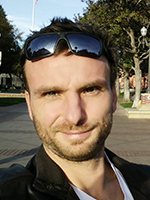 |
||
Home > TERATEC FORUM > Workshops
Tuesday June 22 - Technical workshop
Workshop 02 - 16:00 to 18:00
Communicable diseases and vision disorders
Chaired by Philippe Gesnouin, Tech Transfer Associate for Life Science and Healthcare, Inria and Richard Bosmans, Directeur des Partenariats et Financements Externes de la R&D, Essilor International
How can advanced AI methods coupled with epidemiological models enable public health decision making?
By Mélanie Prague, Chercheuse permanente, SISTM Inria et Clément Moulin-Frier, Chercheur, Flowers Inria
 |
Modeling the dynamics of epidemics helps proposing control strategies based on pharmaceutical and non-pharmaceutical interventions (contact limitation, lock down, vaccination, etc). Hand-designing such strategies is not trivial because of the number of possible interventions and the difficulty to predict long-term effects.
This task can be cast as an optimization problem where state-of-the-art machine learning algorithms such as deep reinforcement learning, might bring significant value. We use Reinforcement learning algorithms (DQN, NSAG-II, …) to find optimal policies for dynamical on-off lock-down control under the optimization of death toll and economic recess using an extended Susceptible-Exposed-Infectious-Removed (seir) model for COVID-19.
We introduce EpidemiOptim, a Python toolbox that facilitates collaborations between researchers in epidemiology (models), policies makers (cost functions, state of actions) and optimization (learning algorithm).
 |
Biography: Melanie Prague is a permanent researcher at Inria (University of Bordeaux, France) in the SISTM team (Statistics in Immunology and translational medicine) since October 2016. Since 2013, she holds a PhD in Biostatistics and Public Health from the University of Bordeaux, France. She also was a postdoctoral fellow during almost three years at Harvard School of Public Health (Boston, USA). Her research focuses on the development of statistical methods for treatment and prevention of infectious diseases. She develops both within-host and between-host models to accelerate the development of treatments and vaccines. Her main fundings are centered around applications on HIV, Ebola, Nipah and COVID-19. |
|---|---|
 |
Biography : Clément Moulin-Frier obtained his PhD in Engineering of Cognition, Interaction, Learning and Creation from Grenoble University in 2011. His main research interest is the computational modeling of emergent social behavior in artificial agents, studying the role of cognitive, morphological, sensory-motor and environmental factors. In 2009, he was a visiting scholar in Michael Arbib's lab at the University of Southern California in Los Angeles, USA. After a short contract at the College de France in Paris where he worked on probabilist optimal control for bidedal robots, he conducted his research between 2011 and 2014 in the Flowers group at Inria Bordeaux in the field of developmental robotics. From 2015 to 2017 he was a post-doctoral researcher in the Synthetic, Perceptive, Emotive and Cognitive Systems laboratory (SPECS lab, Barcelona), in particular on social robotics European projects such as WYSIWYD and SocSMCs. From 2017 to 2019 he was a research scientist at Cogitai, a US-based research company working on continual reinforcement learning. Since October 2019, he is now a permanent researcher (chargé de recherche) in the Flowers group at Inria Bordeaux Sud-Ouest. |
Register now and get your badge here
- TERATEC Forum is strictly reserved for professionals.
- Participation to exhibition, conferences and workshops is free (subject to seats available)
- On line registration is obligatory.